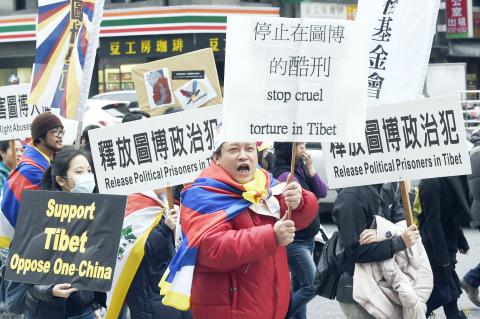Hundreds of Tibetans and Tibet supporters yesterday marched in Taipei to commemorate the 55th anniversary of the 1959 Tibetan uprising against China, as well as to remember more than 126 Tibetans who have self-immolated since 2009 over freedom and rights in Tibet.
The parade departed from Zhongxiao Fuxing MRT Station shortly after a rendition of the Tibetan national anthem and a performance of a song about the uprising.
Demonstrators carried Tibetan flags and signs condemning Chinese repression of Tibetans and chanted “Free Tibet,” “Tibet belongs to Tibetans” and “China get out of Tibet” in Mandarin and in English.

Photo: Liu Yen-fu, Taipei Times
“On the 55th anniversary of the 1959 Tibetan uprising, I would like to first pay my deepest respect to our Tibetan brothers and sisters who sacrificed their lives for the freedom of Tibet and to protest the illegal occupation of Tibet by China,” Tenzin Chompel, vice president of Regional Tibetan Youth Congress Taiwan, told the crowd before the start of the parade.
“I would like to call on the Chinese government to positively respond to demands made by Tibetans with their lives — including allowing the Dalai Lama to return to Tibet, freeing Tibetan political prisoners, stopping population transfer into Tibet, ending so-called ‘patriotic education,’ and ending nuclear tests, mining and the construction of dams in Tibet — which may affect millions of people in Asia — and allow international media outlets and human rights groups into Tibet,” he said.
Yiong Cong-ziin (楊長鎮), a representative of Taiwan Friends of Tibet, said China would not become a great nation because of its size or the number of missiles it has.
“China can only become a great and respected nation by becoming civilized, and it can start to become a great nation by supporting Taiwanese and Tibetan independence,” Yiong said.
New York-based Tibetan activist Tenzin Dorjee said that while many people may think that the nation was defeated by Chinese troops 55 years ago, when the Dalai Lama and hundreds of thousands of Tibetans fled Tibet, he holds a different view.
“China has failed to wipe Tibet off the map or make people forget about Tibet, which it had hoped to do,” he said.
“Hence, China is being defeated every single day, when people voice their support for Tibet’s freedom,” he added.
As the parade passed through busy shopping areas in the city, many people stopped to watch and take pictures.
There were Chinese tourists among the onlookers and they reacted differently to the parade.
One of them asked his Taiwanese tour guide: “Why are they allowed on the streets?”
“Because Taiwan is a country where people enjoy freedom of expression,” the tour guide said.
The parade ended at Taipei 101 and was followed by a brief rally.

Several Chinese Nationalist Party (KMT) officials including Chairman Eric Chu (朱立倫) are to be summoned for questioning and then transferred to prosecutors for holding an illegal assembly in Taipei last night, the Taipei Police said today. Chu and two others hosted an illegal assembly and are to be requested to explain their actions, the Taipei City Police Department's Zhongzheng (中正) First Precinct said, referring to a protest held after Huang Lu Chin-ju (黃呂錦茹), KMT Taipei's chapter director, and several other KMT staffers were questioned for alleged signature forgery in recall petitions against Democratic Progressive Party (DPP) legislators. Taipei prosecutors had filed

Taiwan would welcome the return of Honduras as a diplomatic ally if its next president decides to make such a move, Minister of Foreign Affairs Lin Chia-lung (林佳龍) said yesterday. “Of course, we would welcome Honduras if they want to restore diplomatic ties with Taiwan after their elections,” Lin said at a meeting of the legislature’s Foreign Affairs and National Defense Committee, when asked to comment on statements made by two of the three Honduran presidential candidates during the presidential campaign in the Central American country. Taiwan is paying close attention to the region as a whole in the wake of a

NEW WORLD: Taiwan is pursuing innovative approaches to international relations through economics, trade and values-based diplomacy, the foreign minister said Taiwan would implement a “three-chain strategy” that promotes democratic values in response to US tariffs, Minister of Foreign Affairs Lin Chia-lung (林佳龍) said. Taiwan would aim to create a “global democratic value chain,” seek to capitalize on its position within the first island chain and promote a “non-red supply chain,” Lin was quoted as saying in the ministry’s written report to the Legislative Yuan submitted ahead of the legislature’s Foreign Affairs and National Defense Committee meeting slated for today. The Ministry would also uphold a spirit of mutual beneficial collaboration, maintaining close communication and consultations with Washington to show that Taiwan-US cooperation

Taiwan and the US have begun trade negotiations over tariffs imposed by US President Donald Trump earlier this month, Minister of Foreign Affairs Lin Chia-lung (林佳龍) said in an interview this morning before reporting to the Legislative Yuan’s Foreign Affairs and National Defense Committee. The Taipei Economic and Cultural Representative Office (TECRO), Taiwan’s de facto embassy in the US, has already established communication channels with the US Department of State and the US Trade Representative (USTR), and is engaging in intensive consultations, he said. Points of negotiation include tariffs, non-tariff trade barriers and issues related to investment, procurement and export controls, he